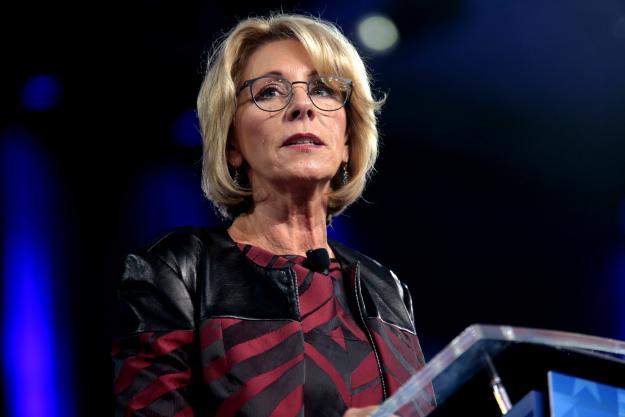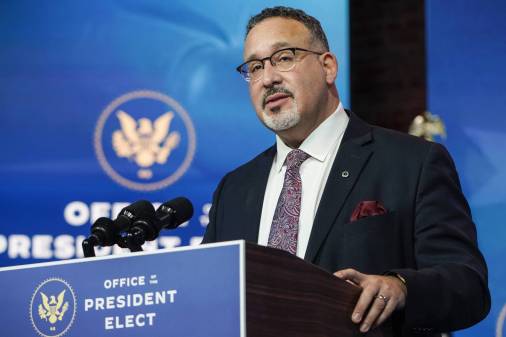The Department of Education wants to make schools safer. But it won’t say how.

Since the inception of the Department of Education’s Federal Commission on School Safety earlier this year, educators, school safety experts and activists have expressed significant confusion about what the panel is actually doing, as well as doubts about its long-term effectiveness.
According to the White House, the commission was created to “quickly provide meaningful and actionable recommendations to keep students safe at school.” Education Secretary Betsy DeVos, the four-member panel’s chairwoman, has promised to release a report on its findings by the end of the year.
Critics say the commission is doing too little, too slowly, however. The members have met in full only once, on March 28. A second meeting was scheduled for May 17, but few people attended because it was announced so late. On May 31, DeVos attended the commission’s first field visit at a Maryland elementary school, where she discussed fostering feelings of community in schools. The other three members — Attorney General Jeff Sessions, Secretary of Health and Human Services Alex Azar and Secretary of Homeland Security Kirstjen Nielsen — sent surrogates.
The rocky start shows a lack of focus, according to school safety experts who spoke to EdScoop, as the commission attempts to take on school safety issues that often require years of experience to handle effectively. The frequency, severity and polarizing nature of school shootings only compound the problem, the experts say, and the panel risks moving ahead without developing any broad analytical perspective.
“The result of all the recent mass shootings in this country is a feeling of tension that I’ve never seen before,” said Michael Dorn, executive director of Safe Havens International, a nonprofit devoted to improving crisis preparedness and safety in education. “That tension, and the fear that accompanies it, is resulting in a lot of unhealthy reactions, including harmful legislation.”
See more on student safety and security in this EdScoop Special Report
Others say that the commission lacks transparency, citing a lack of communication with the public and no clear responses from the White House or Education Department when asked for details on the commission’s work. And when education experts have been included in meetings, as they were during the commission’s May 17 gathering, they were asked not to participate.
School security experts also are concerned that the commission, when it does open itself to the public, is too narrowly focused on survivors and activists. On June 6, the commission hosted a listening session for concerned citizens at the Department of Education’s headquarters in Washington, D.C. Dozens of school safety activists, gun control advocates and education professionals spoke during the day-long event, but not a single member of the commission was present.
President Donald Trump created the panel in response to the Feb. 14 shooting at Marjory Stoneman Douglas High School in Parkland, Florida, that left 17 dead and another 17 wounded. In the three months since the commission was formed, there was another mass shooting — on May 18 — at Santa Fe High School in Texas, leaving 10 dead and 13 injured.
Trump handed down an ambitious, 11-point list of topics to address. It includes age restrictions on firearm purchases, addressing how journalists cover mass shootings, the repeal of Obama-era school discipline policies and improving access to mental health treatment for students, among other things. It’s unclear whether the role of technology in mitigating such crises will be addressed.
Devos, Sessions, Azar and Nielsen haven’t shared much information on how they will work their way through that list.
“The commission needs to hear from experts and practitioners with historical perspectives, as well as research- and practical experience-based perspectives,” said Kenneth Trump, president of National School Safety and Security Services, a private consulting firm based in Cleveland. “There is too much of a ‘do something, do anything, do it now’ reactive context to school safety policy at the federal and state levels that is driven more by politics than professional best practices.”
Past work by Congress and the executive branch could provide some answers, Kenneth Trump said.
“[The commission] should focus on established best practices, restoring a number of post-Columbine federal school safety and emergency preparedness programs that were eliminated over time,” Kenneth Trump said. “While it is good to hear from activists and advocates, many of them come with views unique to a single-incident tragedy rather than having a broad and deep experience and understanding of school safety, security and emergency preparedness policy,”
Dorn agreed with the sentiment that historical context of such incidents is necessary. “When you have an event like a school shooting, even those directly involved don’t have a good handle on what happened for a year or two after,” Dorn told EdScoop. “So it’s important that experts get involved.”
Dorn said that there is no one-size-fits-all solution for improving school safety, which makes it hard to pinpoint a single thing the Education Department’s new commission can do to address the issue.
“Culturally, we want to pass a law, or buy something that will fix everything, but that’s not going to work,” Dorn said. “The programs that are most effective have an appropriate blend of behavioral and mental health assessments, and physical security.”
He pointed to a Department of Education training program that he helped teach in the 1990s called Student Threat Assessment and Management. “It was incredibly successful,” Dorn said. “The idea was that if you can identify kids that need help, or are a safety risk, instead of booting them out of school, you assess the threat properly and get that kid back on track.”
“The key to an effective program like that, though, is time,” Dorn added. “You can’t rush things. And I hope that whatever the school safety commission is doing now, it is something that will take months, not weeks.”




